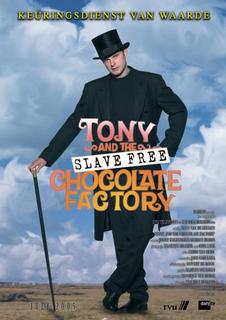Tony and the Chocolate Factory

Am I a pawn? A victim? A cog in the machinery of 21st Century society? Or am I a magnate? An oppressor? The engine that turns the wheels of the world's systems?
These are interesting themes explored in a two-part series of documentaries by Dutch journalist Teun van de Keuken, titled "Tony and the Chocolate Factory." These documentaries are very well-done, satirically entertaining, and highly compelling; I would definitely recommend that you click on the link to see the full version of both documentaries on the internet (a large amount of the films is narrated in English, although it is helpful to know Dutch and/or French for parts of the documentaries).
As both the producer and star of these documentaries, Teun van de Keuken has an interesting goal: to be prosecuted and convicted as an accessory to child slavery -- an offense punishable by Dutch law with up to four years in prison. And as for the precise nature of his involvement in this string of vicious child exploitation? Purchasing and consuming a bar of chocolate.
As he uncovers in the films, it is virtually impossible to eat a single bite of chocolate in our world today that could be guaranteed as "slave-free" -- in fact, it's practically a statistical certainty that any chocolate bought or sold in your neighborhood supermarket or convenience store is at least partially a product of child slavery. It sounds dramatic, but it makes sense if you work it out (as the documentaries do). Approximately 60 percent of the world's cocoa is produced in Côte d'Ivoire (a.k.a. the Ivory Coast of Africa); in fact, every major supplier, manufacturer, and distributor of cocoa and cocoa products uses Côte d'Ivoire cocoa. Thus, when the United Nations estimates that 15-20 percent of the cocoa plantations in Côte d'Ivoire use slave labor -- approximately 200,000 people (including a high ratio of boys between the ages of 12 and 18) -- it seems hard to avoid the fact that America's $13 million dollars per year of chocolate consumption is, more or less, supporting child slavery.
But what am I supposed to do with this information? Should I never eat chocolate again? And what about the clothes I wear -- should I start wearing animal skins and weaving my own fabrics from long grasses? What about the oil that's used for fuel in the city busses I ride? Should I form a commune in the mountains, where we can provide all our own goods and services and never have to deal with the evils of 21st Century society? I don't think this is neccessarily what Teun van de Keuken is advocating -- but how do you draw those lines? What are my roles and responsibilities as an individual? As a follower of Jesus? And what can I really do to fight the powerful forces of economics and politics?
Answers are not easy to come by (as you see in "Tony and the Chocolate Factory"). But at least the questions are worth asking.


1 Comments:
Hi. I'm really interested in the documentaries, but it seems that the link doesn't work. I'll thank you if you help me to found the documentaries in internet. This is my email neanrafra@gmail.com.
Post a Comment
<< Home